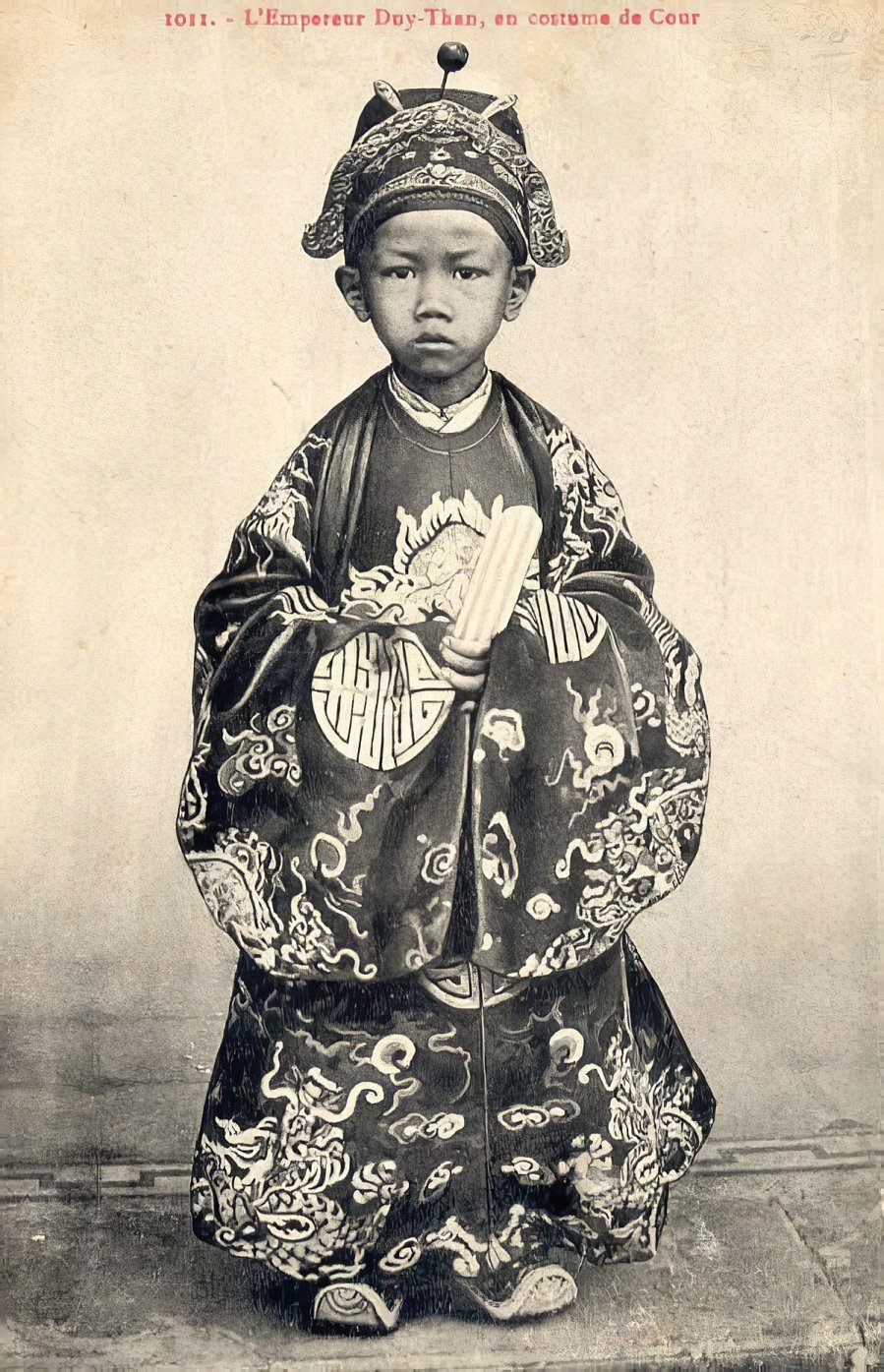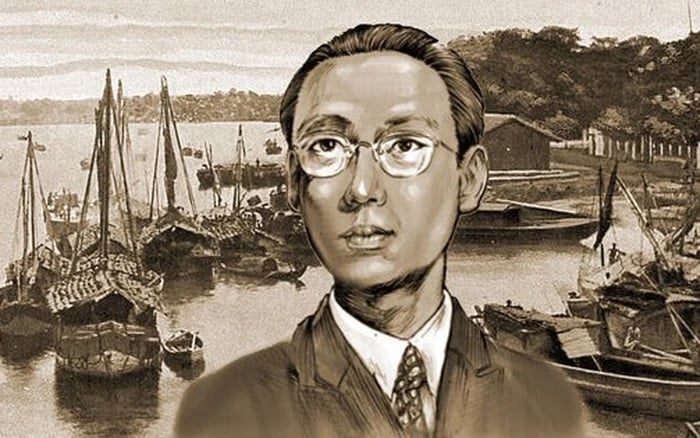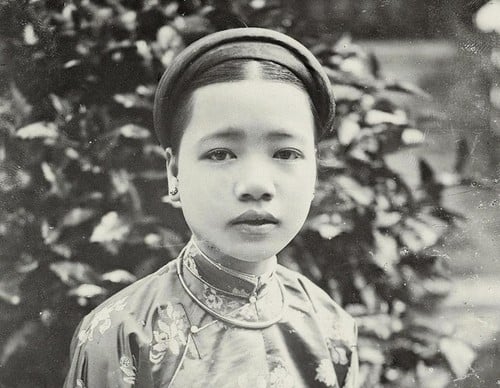A Turbulent Romance Comes to an End
Born in 1900 in the imperial city of Hue, Duy Tan, whose given name was Nguyen Phuc Vinh San, was the eighth son of Emperor Thanh Thai and his consort, Hoang Phi Nguyen Thi Dinh. He would later become the 11th emperor of the Nguyen dynasty.
When his father, Emperor Thanh Thai, was exiled by the French colonialists due to his resistance against their rule, it was customary for the eldest son to succeed him. However, in an attempt to exert even greater control, the French colonialists decided to place the seven-year-old prince, Vinh San, on the throne. This not only demonstrated their manipulation but also marked the beginning of a new and uncertain chapter in the nation’s history. This event not only signified a turning point in Duy Tan’s life but also evoked concerns about the country’s future amidst a tumultuous political landscape.
On September 5, 1907, Vinh San officially ascended the throne and took the reign name Duy Tan. However, what unfolded afterward did not align with the French colonialists’ intentions. Despite his young age, Emperor Duy Tan displayed decisiveness and boldly expressed his defiance against French rule.
Recognizing the young emperor’s strong patriotism, the Vietnam Restoration League, led by Phan Boi Chau, decided to approach him. Two revolutionary figures, Tran Cao Van and Thai Phien, met with Emperor Duy Tan to discuss plans for an uprising against the French colonialists.
In an attempt to weaken the young emperor’s resolve, the French built a resort in Cu Tung, Quang Tri, aiming to entice him into a life of luxury, leisure, and political oblivion. Around 1913, mandarin Ho Dac Trung brought his children, including his daughter Ho Thi Chi, to vacation with Emperor Duy Tan. At that time, Emperor Duy Tan was only 13 years old, while Ho Thi Chi was just 11.

In around 1913, mandarin Ho Dac Trung brought his children, including Ho Thi Chi, to vacation with Emperor Duy Tan.
District Princess Ho Thi Chi, born in 1902, was renowned not only for her beauty but also for her exceptional knowledge. By the age of ten, she could fluently read and write in both Vietnamese and French and had a profound understanding of Han Chinese literature, making her one of the most admired young ladies in the country at that time. The encounter between these two young souls was more than a mere relationship; it ignited their shared aspirations for freedom and revolution amidst a politically complex backdrop.
From their very first meeting, Emperor Duy Tan was captivated by Ho Thi Chi’s beauty and intellect. Conversely, the young lady couldn’t help but admire the young emperor, who carried the weighty responsibility of his nation on his shoulders. On the day of their parting, tears unexpectedly flowed down Ho Thi Chi’s cheeks. Sensing her sincere emotions, Emperor Duy Tan asked her sister, Ho Thi Hanh, to comfort his beloved and promised to return the following year.
Duy Tan was an emperor who constantly grappled with the desire to liberate his country from French colonial rule, and as a result, he once intended never to marry. However, in 1915, after persistent persuasion from his mother, he reluctantly agreed to marry. The two empresses summoned District Princess Ho Thi Chi to the palace, presented her with a pair of gold bracelets, instructed her in court rituals, and discussed wedding plans.
Yet, at the last moment, Emperor Duy Tan called off the wedding. On the day of the royal wedding, the bride in the palanquin was not Ho Thi Chi but a young lady named Mai Thi Vang. The emperor offered no explanation for this sudden decision. It was only later, when Ho Thi Chi’s sister, Ho Thi Hanh, became a nun by the name of Dieu Khong, that she revealed that in 1915, Emperor Duy Tan had been in contact with the leaders of the Vietnam Restoration League, Thai Phien and Tran Cao Van, to prepare for an uprising against the French. Realizing that these plots could endanger the life of his beloved, and with the court refusing to postpone the wedding, Emperor Duy Tan made a choice that perplexed many within the court.
The uprising led by Emperor Duy Tan failed due to a leak in their plans. On May 6, 1916, Emperor Duy Tan, along with many other revolutionaries, was surrounded and captured by the French colonialists and subsequently exiled to the island of Réunion. The French colonialists installed Prince Nguyen Phuc Buu Dao, the eldest son of Emperor Dong Khanh, as the new emperor, with the reign name Khai Dinh.

On May 6, 1916, Emperor Duy Tan and many other revolutionaries were captured by the French colonialists and exiled.
A Childless Empress and a Bitter End
The memoir of Buddhist nun Dieu Khong, whose birth name was Ho Thi Hanh, recounts the emotional stories of her life, especially those concerning her sister, Ho Thi Chi. During the years 1905–1997, she experienced the ups and downs of history, playing an integral part in the nation’s memory.
In 1917, on an important occasion, Emperor Khai Dinh attended the groundbreaking ceremony for the Dong Khanh School. During the event, a young, beautiful, and respectful girl dared to approach him and offered him a pair of scissors. When asked, Emperor Khai Dinh learned that this young lady was the eldest daughter of Mr. Ho Dac Trung.
After the ceremony, Emperor Khai Dinh invited Mr. Ho Dac Trung to the palace, expressing his desire to find a wife who was fluent in French and adept at handling diplomatic matters with finesse. He needed a suitable companion for significant events, and Mr. Ho Dac Trung’s daughter was the person he sought.
However, this news shocked Mr. Ho Dac Trung. He was well aware of his daughter’s deep love for the former emperor, Duy Tan, and agreeing to such an arrangement would be incredibly difficult. When he conveyed the emperor’s intention to Ho Thi Chi, she broke down in tears and pleaded: “I vow to remain with my parents for life and never marry anyone else!”
This statement not only reflected her devotion to her family but also conveyed the depth of her emotions for the former emperor, Duy Tan. It was a tragedy that many women in history had to endure—a conflict between love and duty, between personal aspirations and societal expectations.

When her father conveyed Emperor Khai Dinh’s intention, Ho Thi Chi broke down in tears, expressing her devotion to her family and her love for former emperor Duy Tan.
Amid the political turmoil of the early 20th century, Mr. Ho Dac Trung and his son, Ho Dac Khai, contemplated resigning from their official positions to lead a more tranquil life. However, this decision was opposed by Ho Thi Hanh, Mr. Trung’s close sister. She argued, “My brother and nephew are intellectuals. How can they go back to farming? Moreover, who will provide for the education of their four younger siblings in Hanoi? Emperor Duy Tan sacrificed himself for the nation, so why can’t you make a sacrifice for your family, as he did?”
The very next morning, after a sleepless night filled with tears, District Princess Ho Thi Chi decided to accept the proposal and become a consort of Emperor Khai Dinh.
Upon entering the palace, she was bestowed the title of First-Rank Grace Consort (Nhat giai An phi), the highest rank in the concubine hierarchy during the Nguyen dynasty. In this role, she frequently accompanied the emperor in receiving guests and foreign envoys. With her grace and talent, Grace Consort Chi earned praise from the upper echelons of society at that time. Additionally, she became the nominal “mother” of Bao Dai, the last emperor of Vietnam.
However, her life took a dark turn following Emperor Khai Dinh’s death. Despite their close relationship, Emperor Bao Dai did not bestow any titles upon her. Consequently, Grace Consort Chi was forced to leave the imperial city, spending her final years at An Dinh Residence.
Her life was filled with ups and downs, from her unfulfilled romance with Emperor Duy Tan to her royal title without any offspring. These heartaches gradually led to depression and mental health issues, causing her to live a solitary life until her passing in 1985 at the age of 83. Her life stands as a testament to the harsh realities of fate within the imperial court.



































